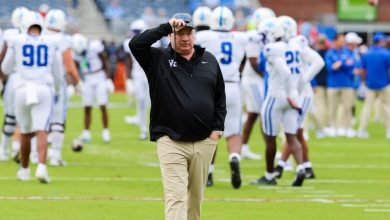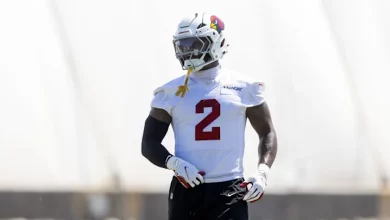Larry Bird emphasized Bill Walton’s health was vital to the 1986 Celtics, noting he played all 80 games that season, which was crucial for the team’s success.

The Boston Celtics of the 1980s were a powerhouse in the NBA, characterized by legendary players, formidable teamwork, and a relentless pursuit of excellence. Among the most iconic rosters of that era was the 1985-86 Celtics team, which captured their 16th NBA championship—a record at the time—cementing their legacy as one of the greatest franchises in sports history. Central to their success was the health and availability of key players, especially Bill Walton, whose presence on the court proved to be a game-changer.
Larry Bird, the legendary Celtics forward and one of the most revered figures in basketball history, often highlighted the importance of Walton’s health to the team’s achievements that season. Bird’s statement that “that year he played 80 games for us” encapsulates how vital Walton’s consistent contribution was to the Celtics’ overall performance and their championship victory.
The Context of the 1986 Celtics
The 1985-86 Celtics team was a blend of experienced veterans and talented role players, led by Bird, Kevin McHale, Robert Parish, and a supporting cast that included Dennis Johnson and Danny Ainge. This core was renowned for its unselfish play, defensive prowess, and resilience.
However, Bill Walton’s story with the Celtics was different from the others. Originally drafted by the Portland Trail Blazers, Walton’s career was marred by injuries and health issues. His move to Boston in 1985 was viewed as a gamble—an opportunity for the veteran center to revive his career and contribute to a team with championship aspirations. When healthy, Walton possessed exceptional basketball IQ, passing ability, rebounding, and shot-blocking skills—traits that complemented the Celtics’ style of play.
The Significance of Walton’s Health in 1986
Larry Bird’s emphasis on Walton’s playing full season underscores how integral Walton was to the Celtics’ success that year. Playing 80 games in an NBA season is a testament to durability, consistency, and resilience—especially for a player with Walton’s injury history. His availability meant the Celtics could rely on him to provide a defensive anchor, facilitate offense from the post and the high post, and serve as a versatile big man capable of making plays.
Walton’s health allowed him to be a steady presence in the middle during critical moments of the season and playoffs. His ability to stay on the floor meant the Celtics could execute their defensive schemes more effectively, switch seamlessly on pick-and-rolls, and maintain offensive flow. Without Walton’s consistent presence, the team’s defensive integrity and offensive spacing could have been compromised.
The Impact of Walton’s Contributions
Throughout the 1986 season, Walton played a pivotal role in several key areas:
Defense and Rim Protection: Walton’s shot-blocking and rebounding were instrumental in controlling the paint. His presence allowed the Celtics to limit second-chance opportunities and protect the rim against opposing offenses.
Passing and Playmaking: Unlike most centers, Walton was an exceptional passer. He often facilitated ball movement from the high post, creating scoring opportunities for teammates. His court vision added a layer of sophistication to the Celtics’ offense.
Leadership and Experience: Walton’s veteran leadership and basketball IQ provided invaluable guidance, especially during intense playoff moments. His calm demeanor and strategic understanding of the game helped stabilize the team.
Offensive Efficiency: Walton contributed offensively by setting screens, rolling to the basket, and making key shots. His offensive versatility made the Celtics’ attack more unpredictable and dynamic.
The 1986 Playoffs and the Role of Walton
The playoffs tested the Celtics’ resilience and depth. Walton’s durability allowed him to be a consistent force throughout their postseason run. His contributions in critical series—such as against the Atlanta Hawks, Milwaukee Bucks, and in the NBA Finals against the Houston Rockets—were vital.
In the Finals, Walton’s presence was particularly noticeable. The Rockets had a talented frontcourt, and Walton’s physicality and defensive presence helped neutralize their inside game. His ability to contribute offensively, combined with his defensive effort, provided the Celtics with the edge they needed to secure the championship.
Larry Bird’s Perspective on Walton’s Health
Larry Bird’s acknowledgment of Walton’s durability and full participation—“that year he played 80 games for us”—reflects the deep appreciation the team and Bird had for Walton’s perseverance and contribution. Bird knew firsthand how injuries could derail a team’s season, and Walton’s healthy season was a testament to his dedication and the Celtics’ management’s efforts to keep him healthy.
Bird’s comment also highlights how much Walton’s availability elevated the team’s overall performance. When Walton was on the court, the Celtics operated more smoothly both offensively and defensively. His presence allowed Bird and other stars to focus on their roles without bearing the full burden of interior defense and rebounding.
The Broader Impact of Walton’s Full Season
Walton’s ability to stay healthy and play all 80 games was not merely a personal achievement; it was a strategic advantage for the Celtics. It underscored the importance of durability in a team’s championship pursuit. In the high-stakes environment of the NBA playoffs, having a dependable big man like Walton could be the difference between winning and losing crucial games.
Moreover, Walton’s durability inspired confidence among teammates. Knowing they had a healthy, skilled center anchoring their defense and facilitating offense allowed the Celtics to approach games with a sense of stability and focus.
The Legacy of the 1986 Celtics and Walton’s Role
The 1986 Celtics team is often celebrated not just for winning the NBA championship, but for their resilience, unselfish play, and the collective effort of all players—including Walton. His health and consistent availability served as a catalyst for the team’s success that season.
Walton’s story with the Celtics is a testament to perseverance and the importance of health in professional sports. His ability to contribute fully during that pivotal year helped cement his legacy as a key piece of one of the franchise’s most successful eras.
Larry Bird’s remark that “that year he played 80 games for us” encapsulates the significance of Bill Walton’s health and durability to the 1986 Boston Celtics’ championship run. Walton’s full participation provided the team with a versatile, intelligent, and dependable interior presence that complemented their star players and contributed to their defensive strength, offensive fluidity, and overall team cohesion.
His resilience and commitment exemplified the dedication required for championship success. Without Walton’s health and consistent contribution, the Celtics’ 1986 triumph might have looked very different. Bird’s respect for Walton’s perseverance reflects the deep appreciation the team had for his role in their historic achievement, and his full season remains a testament to the importance of health, resilience, and teamwork in winning at the highest level of professional basketball.









